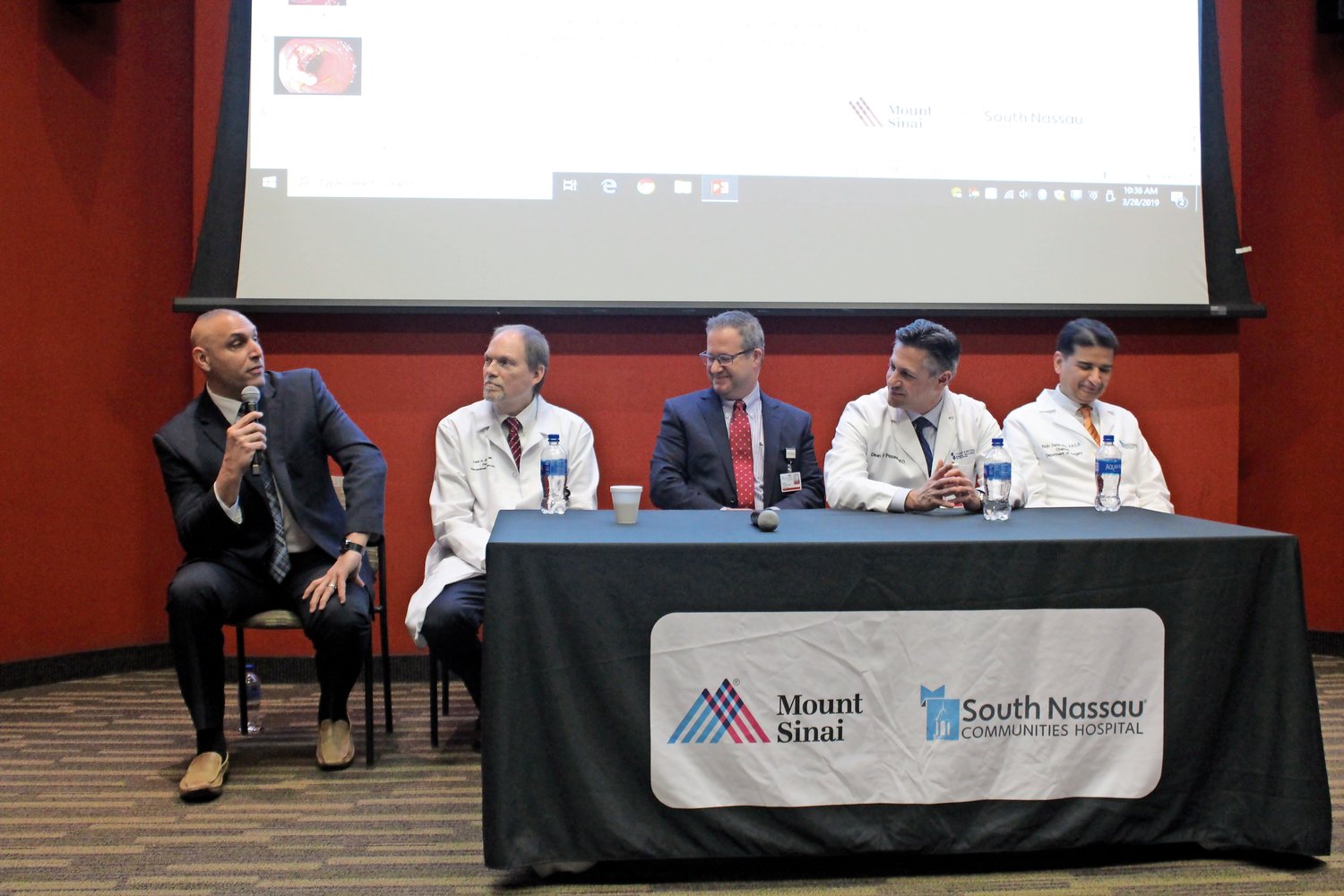South Nassau Communities Hospital raises colon cancer awareness
A colonoscopy is a must by age 45, experts say at prevention seminar in Oceanside
Eric Schrader recalled that when he noticed blood in his stool about two years ago, colon cancer was not on his mind. It wasn’t until six months later, when the blood became excessive, that he sought medical care and was diagnosed with the disease, which kills 50,000 people in the United States annually.
The Merrick resident and Manhattan chef was 45 at the time of his diagnosis. Schrader’s physician had recommended he receive a colonoscopy and endoscopy. When he did, doctors at South Nassau Communities Hospital found a large tumor in his colon and diagnosed him with advanced stage 3C colon cancer.
“I’ll never forget that moment, sitting in that office, not knowing what you’re going to hear and my wife is on my side, he said at a news conference held at South Nassau on March 28. “… It was tough hearing what I was about to encounter, I really had no idea.”
South Nassau held the briefing to stress to the public the importance of getting proper screenings for colon cancer no later than age 45. Four of the hospital’s doctors, who are experts on this particular cancer, spoke about prevention and treatment.
“Colorectal cancer kills more than any other cancer, except lung,” said Dr. Dean Pappas, chief of South Nassau’s Division of Colon & Rectal Surgery. “Thankfully if it’s caught early, the outcomes are very, very good.”
Dr. Rajiv Datta, chair of South Nassau’s Department of Surgery and director of the Gertrude and Louis Feil Cancer Center, treated Schrader with six surgeries and eight chemotherapy sessions. Datta and the other doctors agreed that Schrader’s story is a remarkable one. If his cancer went undetected any longer, it could have spread throughout the body, making treatment more difficult.
“Had I known to get screened early, I would not have had six surgeries,” said Schrader, who is now 47, healthy and back at work. “Early detection is everything.”
With a colonoscopy, doctors can find polyps and subsequently remove them so that they never grow and cause cancer, Pappas said. The procedure to remove polyps, he added, is often noninvasive. He stressed that even if someone does not have family history or symptoms of the disease, it is highly recommended that everyone get screened by age 45. Those with immediate family history of colon cancer are encouraged to get tested even sooner.
Many people are apprehensive about getting a colonoscopy, noted Dr. Frank Gress, South Nassau’s director of interventional endoscopy, but the procedure typically takes only 15 minutes and patients are asleep during it.
“For 15 minutes, it’s going to be the best sleep you get — you’re going to wish that it was longer,” Schrader said, then added, on a more serious note, “It’s definitely worth it not to allow it to continue [until it’s more difficult to treat.]”
Treatments for colon cancer range from various types of surgery to chemotherapy and radiation. Dr. Frank Caliendo, director of South Nassau’s Division of Colon & Rectal Surgery, outlined some of the procedures and technological advancements for removing the cancer, including robotic-assisted surgery that is less invasive than traditional surgeries.
“It’s a myth that if it’s not in your family and you have no symptoms, you’re fine, and that couldn’t be any further from the truth,” Pappas concluded, noting that in 85 percent of cases, there are no symptoms “At 45, make your appointment, don’t even think about it. Get checked.”

 47.0°,
Mostly Cloudy
47.0°,
Mostly Cloudy 




